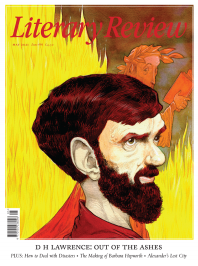Laura Freeman
But Does It Have a Coffee Shop?
The Art Museum in Modern Times
By Charles Saumarez Smith
Thames & Hudson 271pp £30
In a famous 1976 New Yorker cartoon by James Stevenson, an astonished-looking guard stands outside the Solomon R Guggenheim Museum as a small boy on a skateboard comes whizzing out of the open door. The grin on his face says it all. He has just fulfilled the wish of every child who has ever visited the Guggenheim: to come down the ramp of the spiral on wheels, at speed.
A child wouldn’t have got very far with a skateboard on visits to the great 19th-century temple-front museums: the Scottish National Gallery in Edinburgh, the Fitzwilliam Museum in Cambridge or the Glyptothek in Munich. As late as the mid-1930s, Eric Maclagan, then director of the V&A, described the public ‘as a noun of three letters beginning with A and ending with S. We humour them when they suggest absurd reforms, we placate them with small material comforts, but we heave sighs of relief when they go away and leave us to our jobs.’ By then, however, things were starting to change. The museum as ‘Fun Palace’ – Joan Littlewood’s phrase – is a relatively recent phenomenon.
In The Art Museum in Modern Times, Charles Saumarez Smith argues that until at least 1929, when the Museum of Modern Art opened in New York, museums of art were ‘monuments to a certain kind of moral, intellectual and cultural authority. They were designed to impress visitors, not to make

Sign Up to our newsletter
Receive free articles, highlights from the archive, news, details of prizes, and much more.@Lit_Review
Follow Literary Review on Twitter
Twitter Feed
It wasn’t until 1825 that Pepys’s diary became available for the first time. How it was eventually decrypted and published is a story of subterfuge and duplicity.
Kate Loveman tells the tale.
Kate Loveman - Publishing Pepys
Kate Loveman: Publishing Pepys
literaryreview.co.uk
Arthur Christopher Benson was a pillar of the Edwardian establishment. He was supremely well connected. As his newly published diaries reveal, he was also riotously indiscreet.
Piers Brendon compares Benson’s journals to others from the 20th century.
Piers Brendon - Land of Dopes & Tories
Piers Brendon: Land of Dopes & Tories - The Benson Diaries: Selections from the Diary of Arthur Christopher Benson by Eamon Duffy & Ronald Hyam (edd)
literaryreview.co.uk
Of the siblings Gwen and Augustus John, it is Augustus who has commanded most attention from collectors and connoisseurs.
Was he really the finer artist, asks Tanya Harrod, or is it time Gwen emerged from her brother’s shadow?
Tanya Harrod - Cut from the Same Canvas
Tanya Harrod: Cut from the Same Canvas - Artists, Siblings, Visionaries: The Lives and Loves of Gwen and Augustus John by Judith Mackrell
literaryreview.co.uk